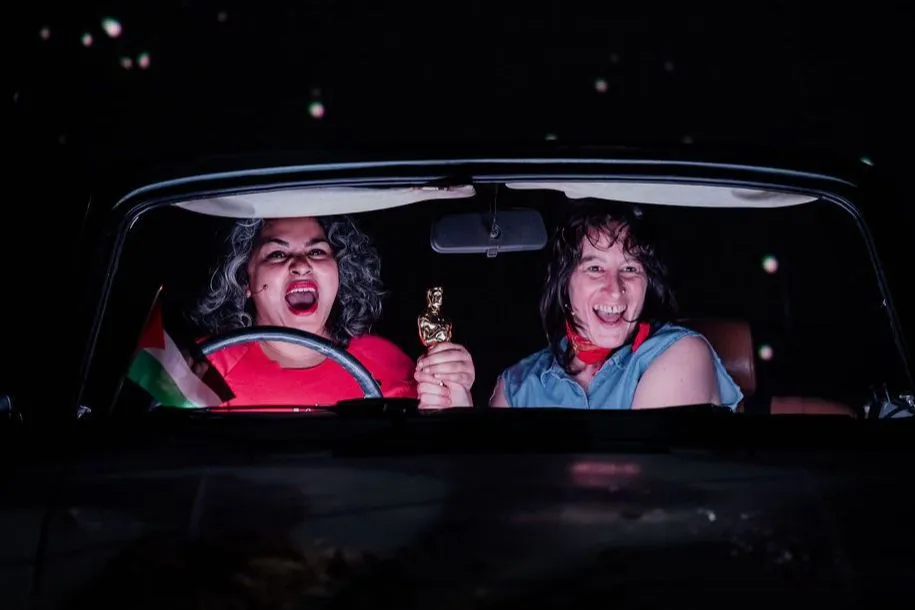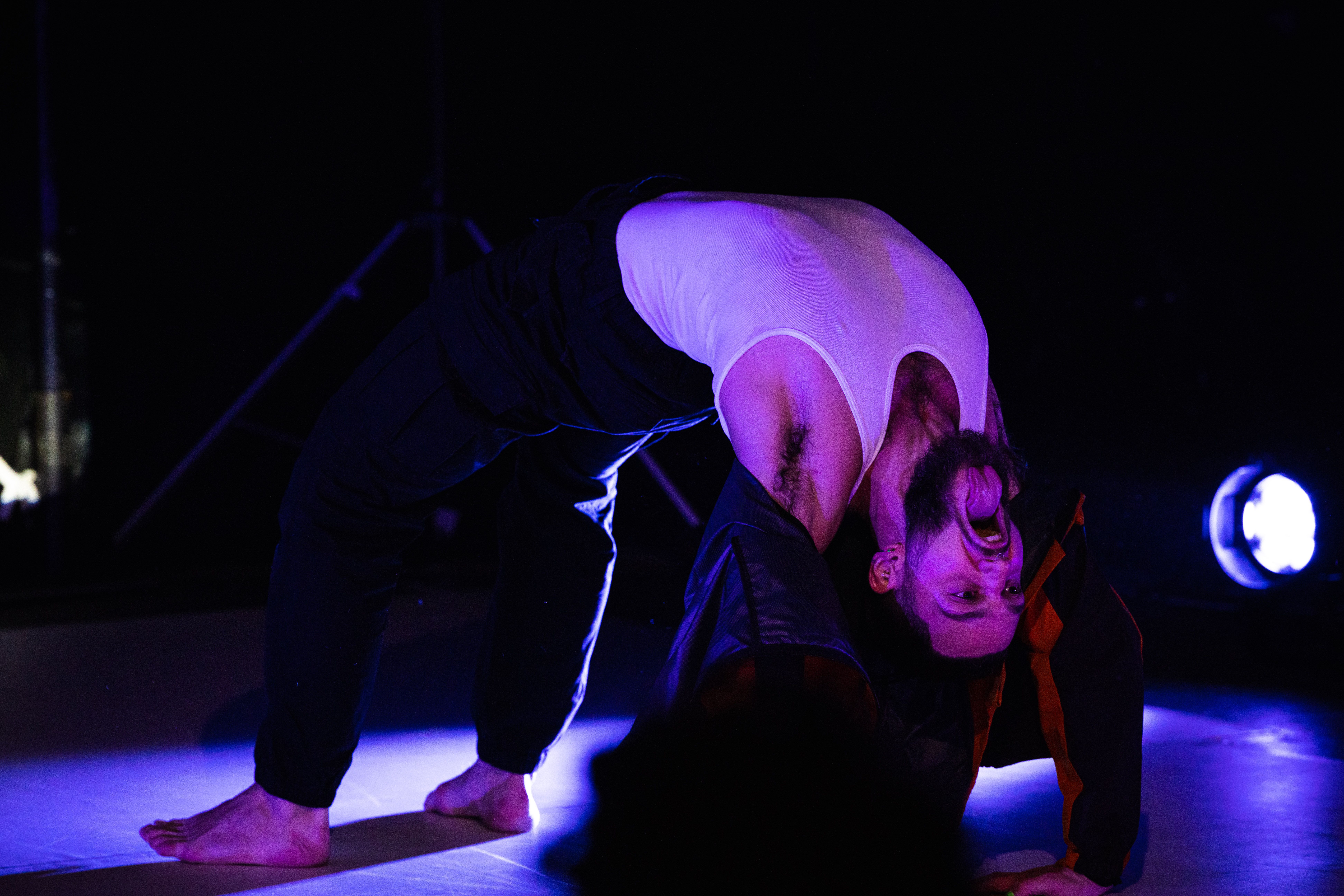F.O.L.A [AKL]: How to Make a Really Great Party…and a Really Great Protest
Co-artistic directors Nisha Madhan and Julia Croft invite us into the blazing, new world they’ve created together with F.O.L.A [AKL], in our new series Pathfinders.

Pathfinders is a new series spotlighting artists and organisations taking the road less travelled by adopting new or innovative approaches to their mahi.
The moment I ask my first question to Nisha Madhan and Julia Croft, I can feel a phenomenal energy begin to unfold around me. There is a sense of urgency in how the co-artistic directors talk about - an underground festival for experimental and live arts in Tāmaki Makaurau.
They rapidly build on each other’s responses, interjecting with punk philosophies and alternative practices and personal realisations. It’s electrifying. And as I listen to Madhan and Croft, I’m aware of being invited into this blazing, new world that they have created together.
It’s only about two minutes into our conversation when Madhan says “Jennifer, you’re really going to have to stop us because we will rant about this for hours. This is our absolute passion. This is our love child.” Their devotion to the practice of live art - as well as supporting live artists - is present in all aspects of F.O.L.A [AKL].
“[F.O.L.A [AKL]] started with me, Nisha and a hot tub on Waiheke Island. Maybe like a bottle or two of rosé deep,” says Croft - and I can’t imagine any other way for this festival to come about. There’s something so tender in this image of two long-term friends and artistic collaborators, “day-drunk in a hot tub”, deciding to create dedicated spaces for experimental and live art in Aotearoa.
But F.O.L.A [AKL] is more than just a spur-of-the-moment idea - it is a direct response to Madhan and Croft’s experiences working as experimental performance artists themselves: “We are creating a space that we wish had existed 10 years ago when we were just starting out.”
Personal experience has shaped the way F.O.L.A [AKL] operates, and it is for this reason that F.O.L.A [AKL] genuinely works to serve artists, artist communities and build an audience for this sort of work.
This talented pair are so familiar with the gaps in this landscape. Madhan’s previous work at Basement Theatre revealed the need for a new model to better support experimental and live artists: “We wanted to create an alternative to box office models - a framework…that was different to the norm in order to make their kind of work possible.” Croft’s background as a performer led her to recognise the unique challenges in creating experimental works. “Artists’ bodies aren’t built for live art performance over long seasons. It can be incredibly challenging.”

But beyond those technical challenges - rectified by “practical micro-actions” such as providing koha towards childcare and offering kai - Croft and Madhan have also faced a “personal amount of hurt” in practicing live art. They were often told that this practice was “unwanted, too weird or unviable”, which, to put in Madhan’s wonderfully succinct words: “is fucking bullshit!”
F.O.L.A [AKL] is a way not only to embed genuine acts of artist care into festival curation, but also to demonstrate the necessity of this form within the arts ecosystem and build an alternative community for live artists who feel invalidated by the mainstream. The reality is that the alternative and mainstream parts of the arts ecosystem need each other to thrive; it’s a two-way relationship.
This disregard for live art is also a distinct disregard for marginalised voices. “BIPOC and queer makers are the ones who are going to practice [experimental and live art] the most - they have it in their history, they have it in their lineage.”
Live art, by virtue of its form, blurs the boundary between story, performer and audience, opening up space for narratives that deviate from “a single linear story starring a white man.” Croft comments that this work may be “messy or chaotic or unwieldy or confusing or disgusting”, but the opportunity to create work from beyond the boundaries of colonial, heteronormative narrative structures is what makes live art so necessary.
Madhan defines live art as “a piece of art or work that unfolds around you in real space, in real time, and has a real and reciprocal relationship with its audience or spectator or witnesses.” Live art can be confronting, experimental, and urgent. Croft firmly believes that this form is necessary for bringing people back to theatres after the pandemic.

“We need to excite audiences again and take risks. Big risks. We need to build new experiences for people and new contexts to see the work”.
F.O.L.A [AKL]’s free programme is a necessary part of this ethos - everyone is invited into the space, whether you are familiar with live art or not. Madhan and Croft have deliberately ensured multiple entry points for different audiences - or, as Croft calls it, “gateway drugs.” Beyond the performances, there is a bar and outdoor installations and free parties. This is all crucial in emphasising that “live and experimental art is so much more accessible than people think.”
Madhan firmly believes that festivals should “serve the public” and that the aim of events like F.O.L.A [AKL] is not just showcasing creative practice - it is also a way to interact with your city, to exist together, to keep going.
This intention to subvert expectations around arts elitism, opening up experimental performance spaces for the wider public, is also evident in their Boosted campaign: “Anyone can be a patron of the arts, whether you give $10,000 or $5.”
Supporting F.O.L.A [AKL] is not just supporting an endeavour that will not affect you - F.O.L.A [AKL] ensures that Tāmaki Makaurau has vibrant and exciting experiences that everyone can enjoy; F.O.L.A [AKL] ensures that artists do not disappear from our landscape.
There is a sense of dread that underlies many creative projects, and artists are acutely aware of the disintegrating state of arts funding. But Croft and Madhan insist on imagining a new model, re-shaping what community arts practices can look like when we step outside of these normative structures.
F.O.L.A [AKL] is a resounding call across the night, reminding us that there is a path through the trees that is much more exciting. As Croft says: “If nothing else, work like this and festivals like this are a collective exhalation for a minute…let's burn as bright as we can and make it the best you can. And no matter what, we'll do it together.”
Returning for a four night midwinter festival from the 11-14 June, F.O.L.A takes over Basement Theatre with performances, exhibitions, rituals and dance floors by fearless artists.
Support F.O.L.A [AKL]’s Boosted Campaign HERE.
Writer Bio: Jennifer Cheuk is a mixed-Hong Kong Chinese writer, curator, and researcher. She is an archivist for the Satellites Asian Arts Archive where she focuses on the documentation of Asian zinemaking and visual narrative practices in New Zealand. Jennifer is also the Founder of Rat World Magazine, and recently published Everything That Moves, Moves Through Another in collaboration with 5ever Books. Overall, she is passionate about community arts practices, alternative forms of storytelling, and curating more accessible spaces for people to experience arts and writing.